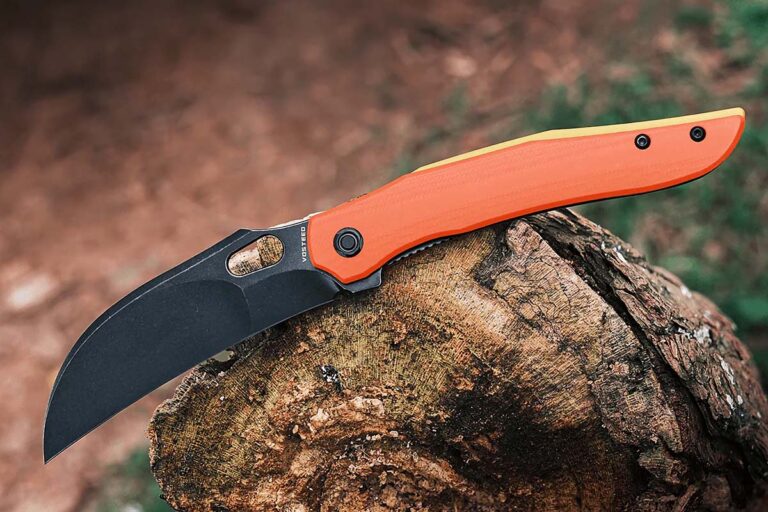In the world of culinary arts, the tools you use can become an extension of yourself, a testament to your skills and dedication. Among these tools, folding knives as heirlooms hold a special place. These knives are not just practical tools; they are pieces of art, history, and family legacy that can be passed down through generations. For kitchen professionals, understanding the value and significance of these heirlooms can enhance the culinary experience and add a personal touch to their craft.
Folding knives have long been cherished for their versatility and compact design. They are not only practical for everyday kitchen use but also stand as symbols of tradition and craftsmanship. Passing down a folding knife as an heirloom can signify the transfer of culinary knowledge and skills, making it a treasured family asset.

The Timeless Appeal of Folding Knives
Folding knives have been around for centuries, with their origins tracing back to ancient times. Their enduring popularity can be attributed to their unique design and practical functionality. The ability to fold the blade into the handle provides safety and convenience, making them ideal for both personal and professional use. For kitchen professionals, the allure of folding knives lies in their ability to blend form and function seamlessly.
The craftsmanship involved in creating a high-quality folding knife is a testament to the skills of artisans who have honed their techniques over generations. Each knife tells a story, with intricate designs and materials that reflect the cultural heritage of its origin. For those in the culinary field, owning a folding knife with historical significance can add a layer of depth to their culinary journey.
The Art of Selecting a Folding Knife
Choosing the right folding knife is an art in itself. For kitchen professionals, it's important to consider factors such as blade material, handle design, and overall balance. The right knife should feel like an extension of your hand, allowing you to execute precise cuts with ease.
Blade material is a crucial consideration when selecting a folding knife. High-quality stainless steel or carbon steel blades are popular choices for their durability and sharpness. Additionally, the handle design should provide a comfortable grip and be made from materials that can withstand the rigors of daily use. For more insights on selecting the perfect folding knife, you can visit this guide.
Preserving the Legacy of Folding Knives
As with any heirloom, proper care and maintenance are essential to preserving the value and functionality of folding knives. Regular cleaning, sharpening, and oiling can prevent rust and ensure the knife remains in top condition for years to come. For kitchen professionals, investing time in maintaining their folding knives can pay off by ensuring these tools remain reliable companions in the kitchen.
Understanding the techniques for blade regrinding or replacing handle scales can also extend the life of a folding knife. Embracing such skills not only enhances the knife's longevity but also deepens the personal connection with the tool.
The Emotional Connection to Heirloom Knives
For many kitchen professionals, folding knives hold sentimental value that goes beyond their practical use. These knives often carry memories of shared meals, culinary achievements, and lessons passed down from mentors or family members. By passing down a folding knife as an heirloom, professionals can share these experiences with future generations, creating a lasting legacy in the kitchen.
Additionally, folding knives can serve as symbols of personal growth and achievement in the culinary field. As professionals hone their skills and gain experience, their knives become a testament to their journey. The act of gifting a folding knife to a young chef can inspire them to pursue their passion and develop their craft.

Folding Knives: A Bridge Between Tradition and Innovation
While folding knives are steeped in tradition, modern innovations have brought new features and materials to these timeless tools. For kitchen professionals, embracing these advancements can enhance their culinary experience while honoring the historical significance of heirloom knives.
Contemporary folding knives may feature advanced locking mechanisms, ergonomic designs, and materials that offer improved durability and performance. Understanding these innovations can help professionals choose knives that meet their specific needs while preserving the essence of traditional craftsmanship.
For more on how folding knives continue to evolve while maintaining their classic appeal, explore different types of pocket knives.
FAQs about Folding Knives as Heirlooms
Q: What makes a folding knife a valuable heirloom?
A: A folding knife becomes a valuable heirloom due to its craftsmanship, historical significance, and the memories it carries. High-quality materials and unique designs add to its value, making it a cherished family possession.
Q: How can I ensure the longevity of my heirloom folding knife?
A: Regular maintenance, such as cleaning, sharpening, and oiling, is crucial for preserving the knife's condition. Learning techniques for blade regrinding or handle scale replacement can also help extend its lifespan.
Q: Are modern folding knives suitable as heirlooms?
A: Yes, modern folding knives with innovative features can be excellent heirlooms. They combine traditional craftsmanship with contemporary advancements, making them practical and valuable tools for passing down through generations.
This article contains affiliate links. We may earn a commission at no extra cost to you.


























